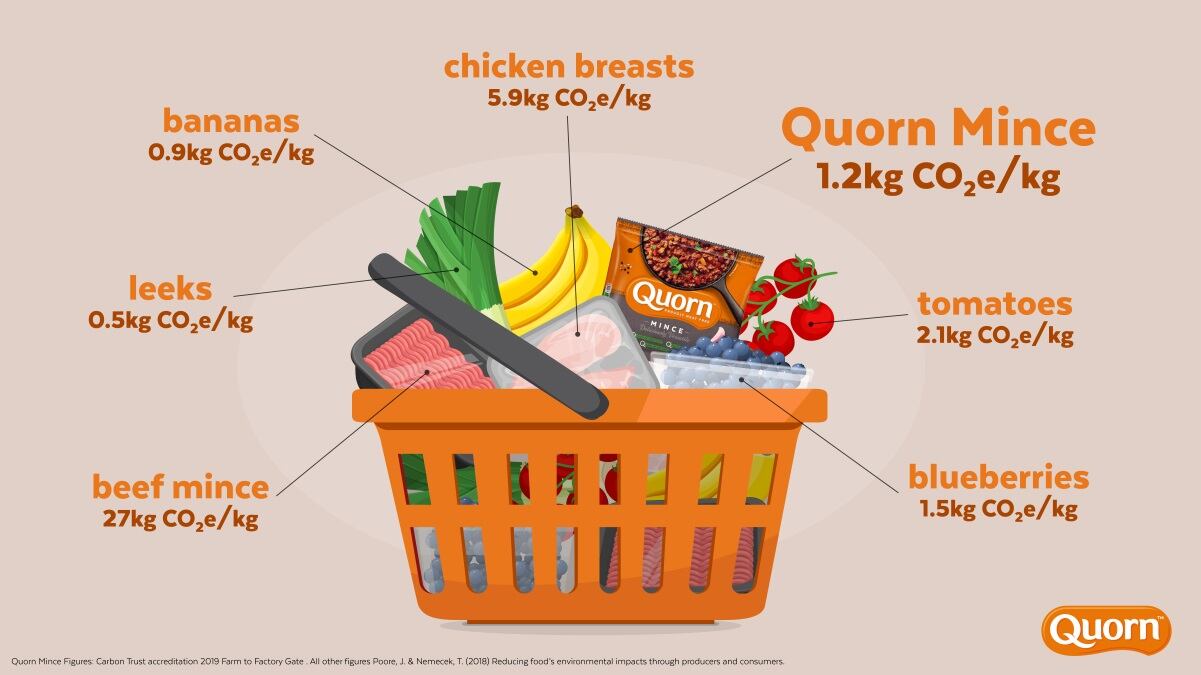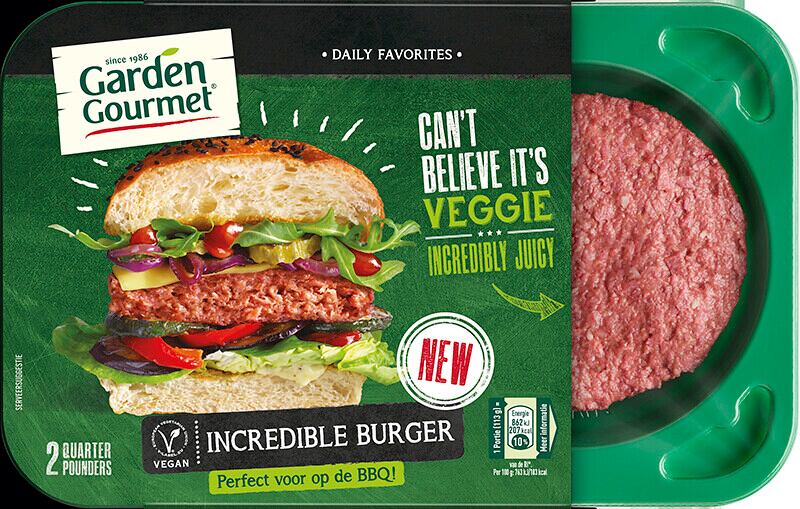Quorn is introducing carbon footprint data for 60% of its product volume. From last week, the company made ‘farm to shop’ carbon footprint data, certified by the Carbon Trust, available for its top 30 selling products. Initially, the company said, the information will be available on its website and the data will be rolled out onto product packaging ‘later’ in 2020.
The move is part of what Quorn describes as a ‘trailblazing’ new consumer outreach campaign focused on the relationship between food consumption and climate change. In the UK, television advertising will seek to highlight ‘how easy it can be’ to make family favourite meals using products like Quorn mince. This, the communications stress, is a ‘step in the right direction’ when it comes to climate change.
“The sustainability crisis needs a space in the spotlight to remind people just how pressing the climate crisis is. Food choice is one small step we can take to make a positive impact. This is why we have created our ‘Step in the Right Direction’ campaign and are providing people with information about the carbon footprint of our products,” Alex Glen who heads up Quorn’s UK marketing, observed.
While health remains a key concern for Quorn consumers and the plant-based movement as a whole, Glen explained sustainability is an issue rapidly moving up the agenda. “Health is still the biggest [purchase] driver, but sustainability is catching up. The benefit of products like Quorn Mince is that they can deliver both healthy and sustainable great tasting food,” he suggested.
Glen insisted that this kind of data ‘is something consumers want to see’. According to a recent YouGov poll, 50% of consumers state they eat meat-free for environmental reasons, and 64% of consumers state they want to reduce their carbon footprint to protect the planet for future generations.
Glen stressed that environmental and health concerns are overlapping issues and suggested Quorn is well-placed to meet consumer expectations on both. “While we pride ourselves on providing a much healthier alternative protein to meat, the focus of our ‘Step in The Right Direction’ campaign reflects our corporate priority on climate reduction and sustainability. We also recognise growing awareness that health and environmental sustainability are not separate issues, but interconnected, especially when it comes to the food system - healthy diets rely on, and contribute to, a healthy planet,” he told this publication.
Future proofing for brand and planet
If helping consumers adopt diets that are lower in carbon is important for the future of the planet, making sure Quorn’s low-carbon credentials are communicated is important for the future of the brand.
The carbon footprint labelling will feature on the British brand’s most popular and long-standing ranges, including Quorn Mince, Quorn Crispy Nuggets and Quorn Sausages plus innovations introduced recently in 2019, such as Quorn Fishless Fillets, Quorn Ultimate Burger and Quorn Wonder Grains. One hundred per cent of Quorn’s products are produced in the UK.
Quorn said it is the first meat-free food manufacturer in the world to take the leap and introduce third party carbon footprint accreditation via the Carbon Trust. Furthermore, the brand was the first food manufacturer to go through the Carbon Trust’s Climate Leadership Framework, to help Quorn identify a roadmap towards achieving net zero emissions.
Glen stressed that Quorn boasts a low carbon footprint when compared to meat products – as well as requiring fewer land and water resources to produce protein. “Because we ferment the main protein source in Quorn products, mycoprotein, our carbon footprint is low, as is our land and water resource requirement.”
In 2018 alone, Quorn products enabled savings of 200,000 tonnes of CO2e compared to meat equivalents, with the greenhouse gas impact of mycoprotein being 90% lower than beef, Carbon Trust data reveals.
The company has completed a full life cycle analysis of the products referenced, including assessing scope 2 and 3 emissions including energy use and transportation. “The labels will communicate the carbon reduction footprint," Glen said.

‘We hope others will follow suit’
Glen said that the campaign was driven by a desire to be ‘transparent’ about the nature of carbon emissions associated with Quorn products. “We believe all food brands should do the same, helping customers to make more informed decisions,” he said.
The marketing executive is optimistic that this increased level of transparency will prompt consumers to factor carbon impact into their shopping behaviour. “We’re hoping that customers will start to be able to identify more clearly the true impact their typical weekly shop can have on the planet and make their decisions accordingly.”
Currently ‘no RDAs exist for carbon emissions’ – partially because carbon data isn’t readily available. But Glen believes consumer expectations will pressure other food brands to begin disclosing this information.
“We definitely hope that others will follow suit in being more transparent about the carbon footprint data associated with their products. We believe that in order to meet the challenge faced by the climate crisis we need to be clearer about the impact our food choices have, and this is one step in that journey.
“While this is a bold and ambitious commitment, and will require a concerted effort from brands to deliver this level of information to consumers, research suggests that two-thirds of consumers support a recognisable carbon footprint label on the products they buy – so we expect others to follow suit in the near future.”




